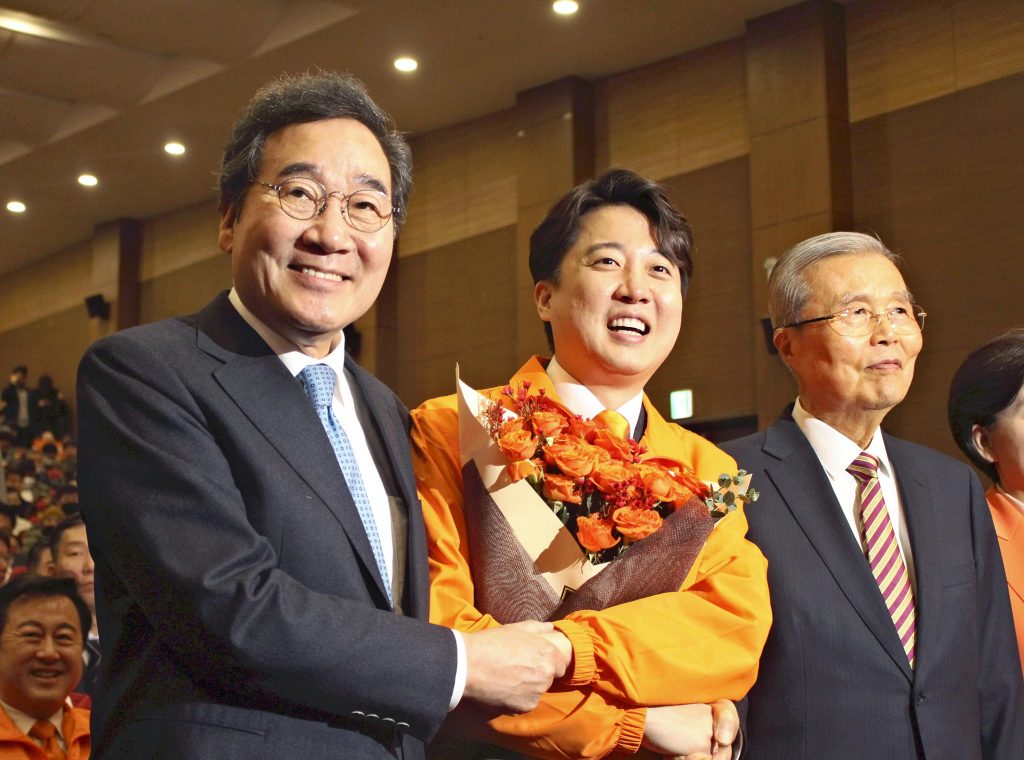The former leaders of South Korea’s two major political parties are set to split away and establish new parties ahead of the general election on 10 April 2024. This reflects the weak institutionalisation of political parties and the limitations of South Korea’s democracy. While the proliferation of political parties could affect the policymaking authority of the ruling Yoon Seok-yeol administration, it is unlikely to provide ideological diversity for South Korean voters.
Lee Jun-seok, the former leader of the conservative People Power Party (PPP), who was suspended until January 2024 for a sexual misconduct scandal, has established a new party ahead of the general election. Having long clashed with many older members of his party, Lee criticised Yoon for his role in political polarisation, ineffective policymaking on education and the falling birth rate, and the political appointment of prosecutors.
Interparty bickering festers on the other end of the spectrum, too. Lee Nak-yeon, former prime minister and former leader of the liberal Democratic Party of Korea (DPK), is also set to establish a new party, claiming that he wants to give hope to the despairing public and aiming to be the largest party in the general election. Lee Nak-yeon has fiercely competed with Lee Jae-myung, the current DPK leader, for the party’s presidential nomination and believes that the various scandals and lawsuits related to Lee Jae-myung are a liability for the party. Lee Nak-yeon has demanded that Lee Jae-myung remove himself as leader of the party and install an emergency committee for the election.
There were also rumours that Lee Nak-yeon will work with other former prime ministers Chung Sye-kyun and Kim Bu-gyeom. Even former justice minister Cho Kuk is reportedly preparing to establish a new party.
The most salient reason for these desertions is the failure of the two major parties — the PPP and DPK — to make reforms ahead of the general election. Defectors cite the public’s poor perception of the parties. According to a Gallup poll in November 2023, 34 per cent of respondents support the PPP and 57 per cent view it unfavourably, while 33 per cent support the DPK and 55 per cent view it unfavourably.
Both parties’ efforts at personnel and policy reform have failed. The PPP launched its innovation committee on 26 October 2023 after a crushing defeat in the byelection for the head of Gangseo District. This loss raised concerns about the existing leadership’s chances in the upcoming election. The PPP innovation committee proposed several ideas for reform, but its call for popular Gyeongsangdo representatives to run in Seoul’s swing districts and to prohibit serving more than three consecutive terms in the same constituency caused conflict within party leadership as these reforms would mostly impact established PPP politicians and a PPP stronghold. Facing pushback, the committee ended its activities two weeks early with little accomplished.
The DPK’s own innovation committee was launched in June 2023 to reform the party amidst its members’ connections to the 2021 cash-for-votes scandal and a crypto coin scandal. It also ceased its activities a month earlier than originally planned due to controversy caused by the inaugural head of the committee. The next committee head appointed 10 days later made the news with her own controversies, threatening the status and credibility of the reform committee even within the party.
Past party splits, like Ahn Chul-soo’s iterations of the People Party, demonstrate that new parties are unlikely to upend the two-party system.
But these party splits are worth examining because they reflect the weak institutionalisation of political parties in South Korea and the failures of its democratic structure. South Korea’s personality-dominated political system undermines parties’ political and ideological orientation and creates political brands based on the personal ambitions of prominent figures like Lee Jun-seok and Lee Nak-yeon. These figures generate interparty competition over party posts and election nominations rather than policy direction. Parties are condemned to factional strife, as demonstrated by the pro and anti-Yoon Seok-yeol and Lee Jae-myung camps within their respective parties.
It remains to be seen whether other prominent defectors join the new camps and whether the two new camps merge to create a third pillar of the South Korean party system. But these party splits could still shift the political landscape in the short term, particularly election dynamics. Under the proportional representation system, even the new parties may have a chance of winning some seats. The PPP, and the Yoon administration, may be undermined as Lee Jun-seok is perceived to command a sizable portion of the youth vote.
The public seems disappointed by the main parties’ internal fractures and stubborn resistance to reform, but is also not keen on the establishment of new parties. This issue is not only one of immediate concern for the outcome of the general election, but also touches on the larger issues of how individual politicians and political parties should fulfill democratic accountability and how personal political ambition should be balanced against party success.
Soyoung Kim is a PhD candidate at the S Rajaratnam School of International Studies, Nanyang Technological University, Singapore.

